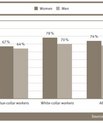Labour markets
On this page, you will find all content related to the labour markets in the Nordic countries.
Emigration in the Nordics: an overview since 1800s

Employer federations in the Nordics

Gender segregation in the Nordic labour market

Labour movement in the Nordic countries

Trade unions in the Nordic countries

Solidaristic wage policy

Labour markets in the Nordics

